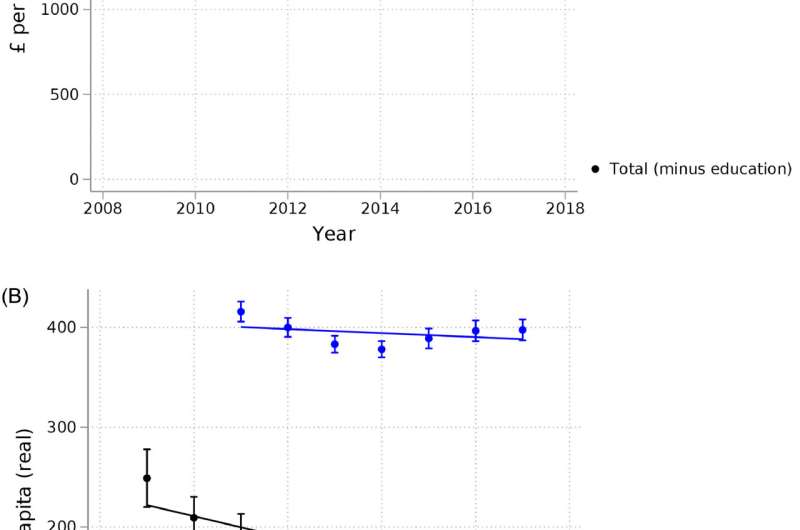Local authority austerity associated with poor health

Local government spending cuts are associated with worse multimorbidity and health-related quality of life according to a study by University of Manchester health economists.
The longitudinal study of 147 English local authorities revealed that a 1% cut in per capita total service expenditure was associated with a 0.1% increase in multimorbidity—the prevalence of people with two or more chronic conditions.
After controlling for other spending, a 1% cut in public health expenditure was associated with a 0.15% increase in prevalence of multimorbidity.
Though they found no association between public health expenditure and health-related quality of life, a 1% cut in adult social care expenditure was associated with a 0.01% decrease in average health-related quality of life.
The study was published in The Lancet Regional Health—Europe.
All the local authorities in the study experienced real spending cuts between 2009 and 2018, varying from 42% in Barking and Dagenham to 0.3% in Sefton.
The average total spending cut was 22%, which would suggest an average 2.2 percentage point increase in multimorbidity in England over the period.
Social care expenditure, they found, stagnated: in equivalent terms it was £416 per person in 2011/12, and £398 in 2017/18.
The researchers measured the prevalence of multimorbidity from 2011 to 18, and health-related quality of life from 2012 to 17 using data from the annual GP Patient Survey of more than 400,000 people.
Although they showed that total public health expenditure increased slightly over the period of analysis, like-for-like public health expenditure actually fell in real-terms from 2014/15.
In particular, funding for health at work programs fell by 47%, the NHS health check program by 24%, and smoking and tobacco cessation programs by 24%.
Study author Dr. Jonathan Stokes, a Research Fellow from The University of Manchester said: “Recent analysis by the Institute for Fiscal Studies shows that spending will still be substantially less for local government in 2024/25 than in 2010.
“So some local authorities might still have to cut services over the next few years. We show that can have worrying implications on health and related quality of life, particularly for the poorest areas and people who have more reliance on publicly funded services.
“Not only does austerity have implications on current health, it could very well decrease population resilience for future pandemics or other shocks.
“For example, other studies have shown mortality was higher for COVID-19 for those with co-morbidities. The decade of austerity prior to the COVID-19 pandemic and associated multimorbidity increases, therefore, might have worsened the population effects.”
Study author Professor Peter Bower from The University of Manchester said: “These cuts, enacted following the 2008 global financial crisis, were largely imposed by national government, and not primarily influenced by levels of local service needs.
“National policymakers involved in determining grant formulas should aim to better reflect the additional reliance of some communities on this public investment.
Source: Read Full Article


